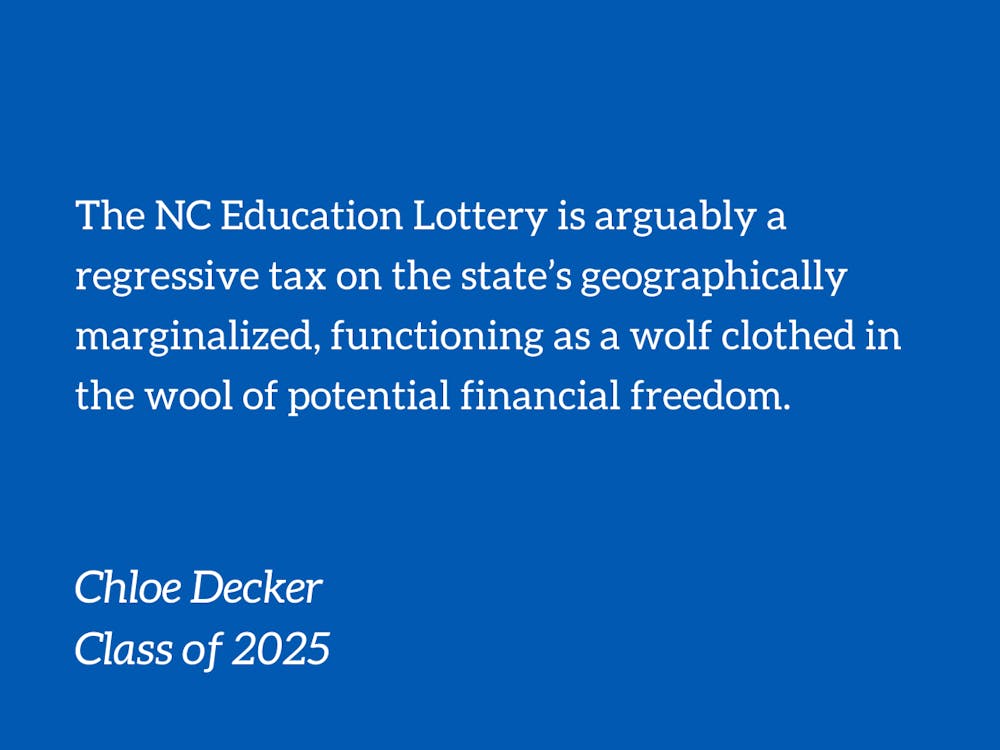Objectively, I’m a big North Carolina fan. The state features the sprawling Blue Ridge mountains, home to the hellbender salamanders who inspired How to Train Your Dragon; the gorgeous Outer Banks coastline, historic waters of the infamous pirate Blackbeard and his escapades; and my longtime favorite chapstick company, Durham’s very own Burt’s Bees. I have come to know this hodgepodge assortment of facts from growing up in the state, through random tidbits I’ve gathered over years of conversations with family and friends alike. But something I’ve also learned growing up here is what North Carolina glaringly lacks: an equitably funded K-12 public education system.
As a 2021 graduate of said system, this is not purely an emotional claim. North Carolina’s judicial system has been calling out the deep-rooted funding inequalities for decades, battling an unrelenting General Assembly uneager to make amends. As highlighted in the ongoing proceedings of the Leandro case, the state is not giving anywhere near enough dollars to ensure every child in the state is receiving an adequate education – currently, the deficit is $1.7B and growing, according to a study commissioned by North Carolina’s Supreme Court last year. Time and time again, the Legislature has resisted putting enough money towards K-12 education, instead turning to half-baked initiatives like the North Carolina Education Lottery.
Touted as the savior solution when launched in 2005, the Legislature promised that 35% of Lottery revenue would be earmarked for hiring more teachers, free prekindergarten, school construction, and college scholarships. But with time, the promises of the Lottery shifted, with the Legislature granting itself the authority in 2013 to divvy up Lottery revenue however it wants. Now, Lottery revenue covers a large percentage of needs that have historically been paid for by the Legislature’s General Fund. The ability of Lottery revenue to replace, rather than add to, funding for existing education costs cancels out the Lottery’s initial purpose. This trend of substitution is why states without education lotteries have been proven to increase education spending more than states with lotteries.
Furthermore, the Lottery’s positive impact is greatly misconstrued. Today, the Lottery makes up less than 4% of North Carolina’s $10B annual education budget, with the majority of funding coming from other state and local taxes. Considering the money the Lottery puts towards prizes, it is ironically far more unfair to play than even the slot machines at North Carolina’s two casinos.
To hide its shortcomings, the Lottery dedicates 2% of its annual revenue to advertising its appeal. Selling the hope of financial freedom, 8 of the top 10 counties in Lottery sales per adult are among the most economically disadvantaged in the state. Many of these counties are situated in eastern North Carolina and have 40-50% minority-identifying populations. Wishing for wealth, lower-income households in North Carolina spend approximately 5 percent of their yearly income on lottery tickets, ranging between $500-$600 per adult in the highest contributing counties.
Despite their greater buy-in to the Lottery, these same counties don’t see the financial fruits of their labor, as the Lottery’s merits mainly go to urban, property-tax rich counties in the Piedmont. Considering this reality, the NC Education Lottery is arguably a regressive tax on the state’s geographically marginalized, functioning as a wolf clothed in the wool of potential financial freedom.
Its painstakingly constructed positive brand has made it resistant to significant critique over the years; as it stands, there is no expectation that the NC Education Lottery will end anytime soon. It’s proven itself to be a money maker for the state, bringing in $3B total in 2020. For the love of children, not money, shouldn't state leaders seek to do better for North Carolina schools?
Chloe Decker is a Trinity sophomore. Her column typically runs on alternate Tuesdays.
Get The Chronicle straight to your inbox
Sign up for our weekly newsletter. Cancel at any time.

